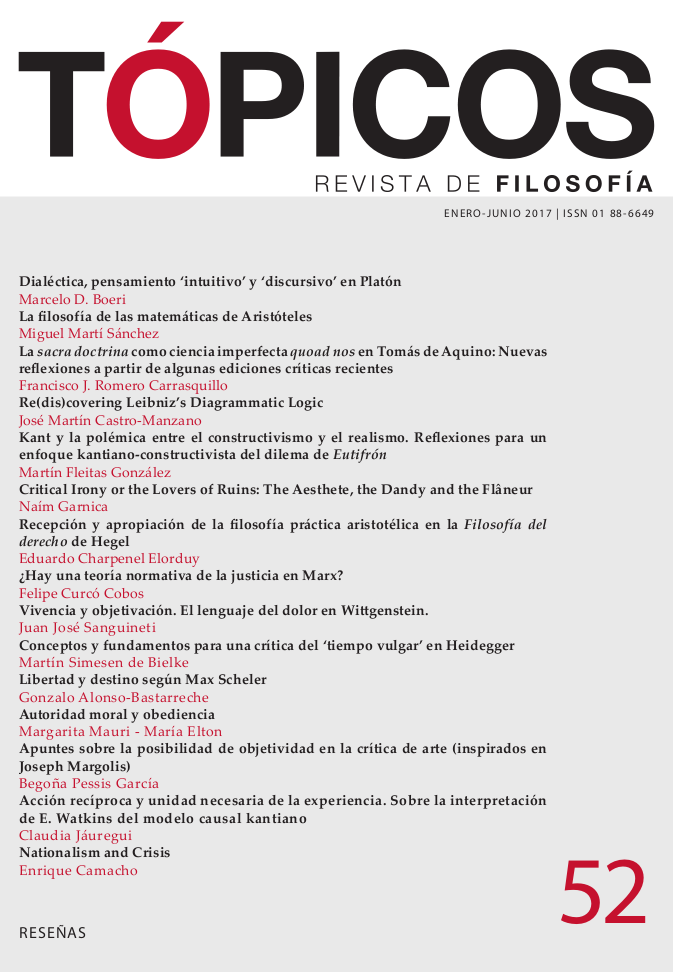Publicado 2016-12-27
Palabras clave
- I. Kant,
- fuentes de la normatividad,
- constructivismo,
- realismo,
- constitutivismo.
Cómo citar
Resumen
La intensa discusión que mantienen los constructivistas y realistas en torno a si Kant habría asumido una teoría de valor “proyeccionista” o “detectivista”, ha puesto al desnudo las insuficiencias del lenguaje y los términos empleados. Lo que podríamos llamar “lenguaje de Eutifrón”, no parece abrigar la suficiente sensibilidad como para capturar la singularidad de la ética kantiana. Ciertamente, Kant realiza afirmaciones proyeccionistas y detectivistas, y esto se debe a que su enfoque acerca de la normatividad posee componentes tanto constructivistas como realistas. En virtud de ello, el presente trabajo defiende la tesis de que la ética kantiana asume una teoría “constitutivista” del valor, la cual, en pocas palabras, entiende que las fuentes de la normatividad y el valor son construcciones reflexivas del agente que implican, al mismo tiempo, y de forma performativa, la asunción realista de la libertad en cuanto que valor absoluto.
Referencias
- Allison, H. (2006). Kant on Freedom of the Will. En Guyer, P. (ed.) The Cambridge Companion to Kant and Modern Philosophy. (381-415) Cambridge: Cambridge University Press.
- ____(1990). Kant’s Theory of Freedom. Cambridge: Cambridge University Press.
- Apel, K.O. (1998). La ética del discurso como la ética de la responsabilidad. Una transformación posmetafísica de la ética de Kant. En Apel, K.O. Teoría de la verdad y ética del discurso. (147-184). Barcelona: Paidós.
- Benhabib, S. (1986). The Generalized and the Concrete Other. The Kohlberg-Gilligan Controversy and Moral Theory. En Praxis International, V-4, 402-424.
- Cohen, G. A. (1996). Reason, Humanity, and The Moral Law. En Korsgaard, Ch. The Sources of Normativity. (207-234). New York: Cambridge University Press.
- Conill, J. (1991). El enigma del animal fantástico. Madrid: Tecnos.
- Fitzpatrick, W. (2005). The Practical Turn in Ethical Theory: Korsgaard’s Constructivism, Realism, and the Nature of Normativity. En Ethics, CXV-4, 651-691.
- Formosa, P. (2011). Is Kant a Moral Constructivist or a Moral Realist? En European Journal of Philosophy, XXI-2, 170-196.
- Graye , F. (1951). Deutung und Darstellung der theoretischen Philosophie Kants. Hamburg: Felix Meiner.
- Guyer, P. (2000). Kant on Freedom, Law, and Happiness. Cambridge: Cambridge University Press.
- ____(1998). The Value of Reason and the Value of Freedom. En Ethics,
- CIX-1, 22-35.
- Habermas, J. (1998). The Inclusion of the Other: Studies in Political Theory. Cambridge, Mass.: MIT Press.
- Herman, B. (1993a). Could It Be Worth Thinking About Kant on Sex and Marriage? En Anthony, L. & Wi , Ch. (eds.) A Mind of One’s Own: Feminist Essays on Reason and Objectivity. (53-72). Boulder: Westview Press.
- ____(1993b). The Practic of Moral Judgement. Cambridge: Harvard University Press.
- Hill, T. (1992). Dignity and Practical Reason in Kant’s Ethics. Ithaca, N.Y.: Cornell University Press.
- Hills, A. (2008). Kantian Value Realism. En Ratio (new series), XXI-2, 182- 200.
- Höffe, O. (1994). Immanuel Kant. Farrier, M. (trad.) Oxford: Oxford University Press.
- Honneth, A. (2014). El Derecho de la Libertad. Esbozo de una eticidad democrática. Buenos Aires: Katz.
- Korsgaard, Ch. (2009). Self-Constitution. Agency, Identity, Integrity. New York: Cambridge University Press.
- ____(2008). The Constitution of Agency. Essays on Practical Reason and Moral Psychology. New York: Oxford University Press.
- ____(2000). Las Fuentes de la Normatividad. Lecuona, L. y Manríquez, L. E. (trad.) México: UNAM.
- ____(1996) Creating the Kingdom of Ends. Cambridge: Cambridge University Press.
- ____(1986) Aristotle and Kant on the Source of Value. En Ethics, XCVI-3, 486-505.
- Langton, R. (2007). Objective and Unconditioned Value. Philosophical Review, CXVI-2, 157–85.
- Lueck, B. (2009). Kant ́s fact of Reason as Source of Normativity. En Inquiry, LII-6, 596–608.
- MacIntyre, A. (1967). A Short History of Ethics. London: Routledge & Kegan Paul.
- Nino, C. (1989). El constructivismo ético. Madrid: Centro de Estudios
- Constitucionales.
- O ́Neill, O. (1996). Towards Justice and Virtue. England: Cambridge University Press.
- ____(1989). Constructions of Reason: Explorations of Kant’s Practical Philosophy. England: Cambridge University Press.
- Pippin, R. (2000). Kant’s Theory of Value: On Allen Wood’s Kant’s Ethical
- Thought. En Inquiry, XLIII-2, 239-266.
- Putnam, H. (2004). El desplome de la dicotomía hecho-valor y otros ensayos. Barcelona: Paidós.
- Rauscher, F. (2002). Kant’s Moral Anti-Realism. En Journal of the History of Philosophy, XL-4, 477-499.
- ____(1998). Kant ́s Two Priorities of Practical Reason. En British Journal for the History of Philosophy, VI-3, 397-419.
- Rawls, J. (1980). Kantian Constructivism in Moral Theory. En The Journal of Philosophy, LXXVII-9, 515-572.
- Raz, J. (1988). The Morality of Freedom. Oxford: Oxford University Press.
- Scarre, G. (1998). Interpreting the Categorical Imperative. En British Journal of History of Philosophy, VI-2, 223-236.
- Schönecker, D. (2013). A free will and a will under moral law are the same. En Sensen, O. (ed.) Kant on Moral Autonomy. (225-245). New York: Cambridge University Press.
- Sedgwick, S. (1988). Hegel’s Critique of the Subjective Idealism of Kant’s Ethics. En Journal of the History of Philosophy, XXVI-1, 89-105.
- Sensen, O. (2011). Kant on Human Dignity. Berlin: Walter de Gruyter Gmbll & Co.
- ____(2010). Dignity and the Formula of Humanity. En Timmermann, J. (ed.) Kant’s ‘‘Groundwork of the Metaphysics of Morals’’: A Critical Guide. (102-118). Cambridge: Cambridge University Press.
- ____(2009). Kant ́s Conception of Inner Value. En European Journal of
- Philosophy XIX-2, 262-280.
- Stuhlmann-Laeisz, R. (1976). Kants Logik. Berlin-New York: Walter de
- Gruyter.
- Tugendhat, E. (1986). Self-Consciousness and Self-Determination. London: MIT Press.
- Ware, O. (2014). Rethinking Kant ́s Fact of Reason. En Philosophers ́
- Imprint, XIV-32, 1-21.
- Wildt, A. (1982). Autonomie und Anerkennung. Stuttgart: Klett-Cotta.
- Wood, A. (1999). Kant’s Ethical Thought. Cambridge: Cambridge University Press.
- ____(1991). Preliminary Study. En Hegel, G.W.F. Elements of the Philosophy of Right. Nisbet, H. B. (trad.) (381-480). Cambridge: Cambridge University Press.






